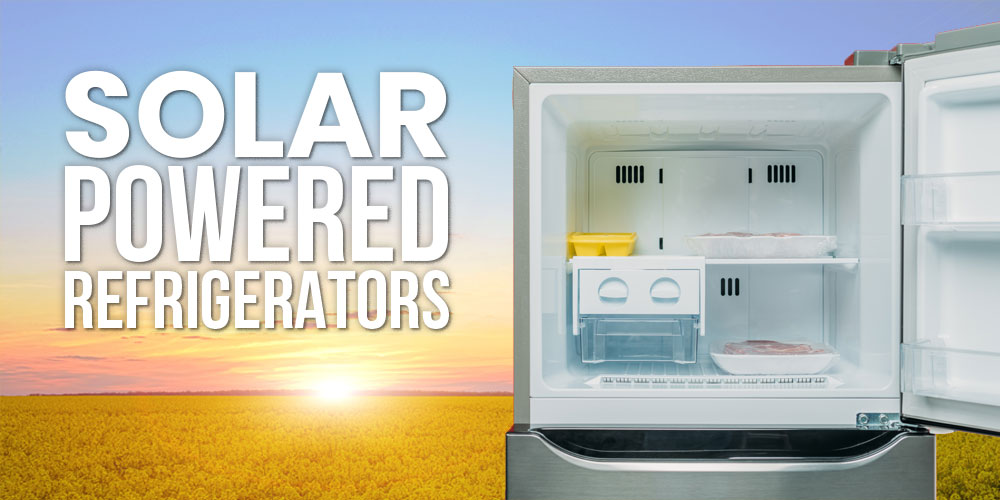
NAVIGATION
Fridges today are highly efficient and require a lot less power than they used to. They are getting easier and easier to run off grid. I have honestly been surprised by how easy it was to connect my fridge to solar power and use it regularly!
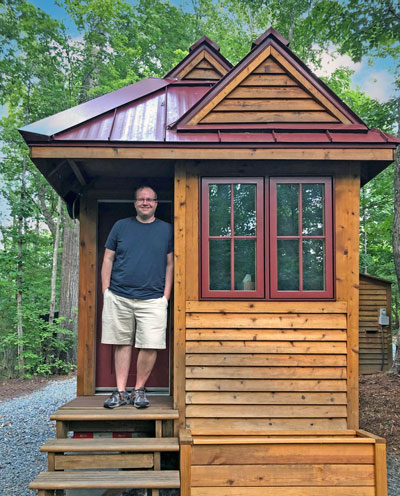
Hi, I’m Ryan
I’ve been depending on solar power in my tiny house for over a decade now and haven’t looked back once. My fridge only uses approximately 60 watts, which is about the same wattage as a traditional lightbulb.

Can A Refrigerator Run On Solar Power Alone?

When I first decided to go off grid in my tiny house and homestead, I needed to make sure that I had enough power to run all of my essential devices. Of course, being able to power my refrigerator was at the very top of my list, so I wanted to ensure this was plausible.
Running a fridge on solar power shouldn’t be too much of a challenge as long as the fridge has a brushless motor and good insulation. These two elements are a must when running a fridge on solar alone.
How To Run A Refrigerator On Solar Power

Over the past decade, I’ve had to figure out things like how to run my air conditioning off solar, cooking with a solar oven, how to use solar generators as backup power in a pinch, and of course, how to use solar for my fridge. When it comes to the fridge specifically, there were a couple steps I took to figure out how much power I would need, and how to keep my fridge from losing power.
How Many Watts Does A Solar Powered Fridge Use?

The first step I took to set up solar power for my fridge was to calculate how much power my refrigerator needed. I was able to find this number on the inside of my refrigerator door, but it may also be on the manufacturer’s website if you can’t find it inside the fridge itself.
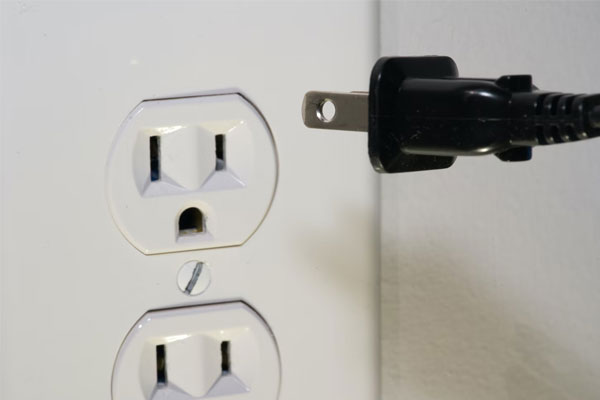 The number on the label will be in volts and amps, but wattage is what’s needed. To get to the number of daily watts your fridge will need to run, you can usually multiply the amps and volts together (but not always, so check a manual if you’re unsure).
The number on the label will be in volts and amps, but wattage is what’s needed. To get to the number of daily watts your fridge will need to run, you can usually multiply the amps and volts together (but not always, so check a manual if you’re unsure).
Fridges are commonly impacted by something called surge power. When the fridge first kicks on, it will use more amperage for about one second, then it will settle down to a much lower wattage. A full-sized fridge may use about 2–3 amps to run after its initial surge.
My mini fridge pulls about 2 amps at surge for one second, then drops to below 1 amp while running. Using a meter to measure it, it ranges between 60–80 running watts in total.
Wattage Needed To Power A Fridge Is Impacted By
- Age of the refrigerator
- Fridge features
- Size of fridge
- Amount of times fridge is opened in a day
- Amount of time fridge stays open
- How full the fridge is
- Refrigerator temperature
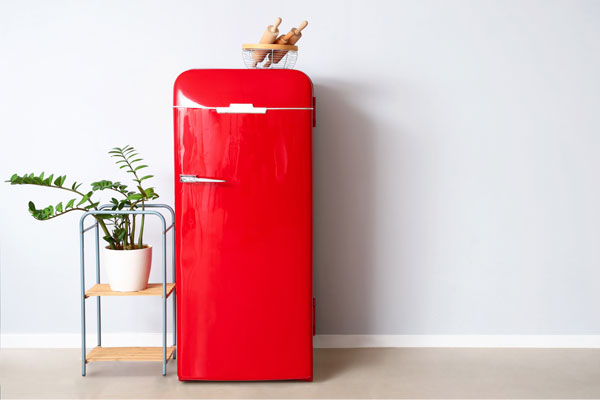
How Many Solar Panels Are Needed To Power A Refrigerator?

What does this mean in terms of installing solar panels? The average refrigerator takes between one and four solar panels to run, but this will vary depending in the power output of the fridge. To get an accurate understanding of the number of panels I needed for my fridge, I knew I had to calculate the kilo watts used in a year as opposed to in a day.
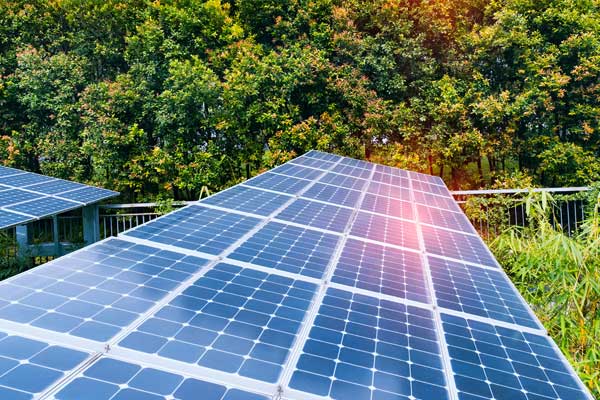 With my solar fridge, I knew it needed 80 watts of power a day. Multiplied by 365 days in a year, that comes to 29,200 watts or 29.2kWh per year. Some higher caliber fridges require up to 1300kWh per year, and there are many factors that contribute to that surge, listed above.
With my solar fridge, I knew it needed 80 watts of power a day. Multiplied by 365 days in a year, that comes to 29,200 watts or 29.2kWh per year. Some higher caliber fridges require up to 1300kWh per year, and there are many factors that contribute to that surge, listed above.
The average solar panel production of a single solar panel is about 30kWh per month. This means, to calculate the number of solar panels I needed for my fridge, I took my annual kilowatts and divided that number by 12 to get my monthly average. Then, I divided that quotient by 30kWh to get the number of solar panels I needed to power my fridge.
Calculation Of How Many Panels My Fridge Needed
Take 29.2kWh divided by 12 (getting the monthly average) = 2.43
2.43 divided by 30 (solar panel output) = .081 or 1 solar panel (rounded up since you can’t buy a fraction of a solar panel)
After doing the math, I knew my fridge needed one panel to have enough power to run on solar alone. However, my fridge energy need was on the lower end. Here are the calculations for the higher end.
Calculation For Panels Needed For High Power Fridge
Take 1300kWh divided by 12 (getting the monthly average) = 108.3
108.3 divided by 30 (solar panel output) = 3.61 or 4 solar panels
When I’m advising people to start their journey with solar, I always say to build in a buffer so they don’t lose power at the worst times. So, if a fridge needs 2 panels to run, buying 3 or 4 panels may be the wisest route to go to compensate for unexpected setbacks like storms or a cloudy day.
What Equipment Do I Need To Run A Fridge On Solar Power?

In order to run a fridge on solar power, there are a few pieces of equipment besides the panels that I use to run my solar fridge. Solar can be an intricate system to set up, but once you get it going, it’s incredibly easy to use and maintain.
Apart from the solar panels, you’ll need the following items
- Charge Controller
- Power Inverter
- Battery System
- PV Wire
- Romex – 120v THHN
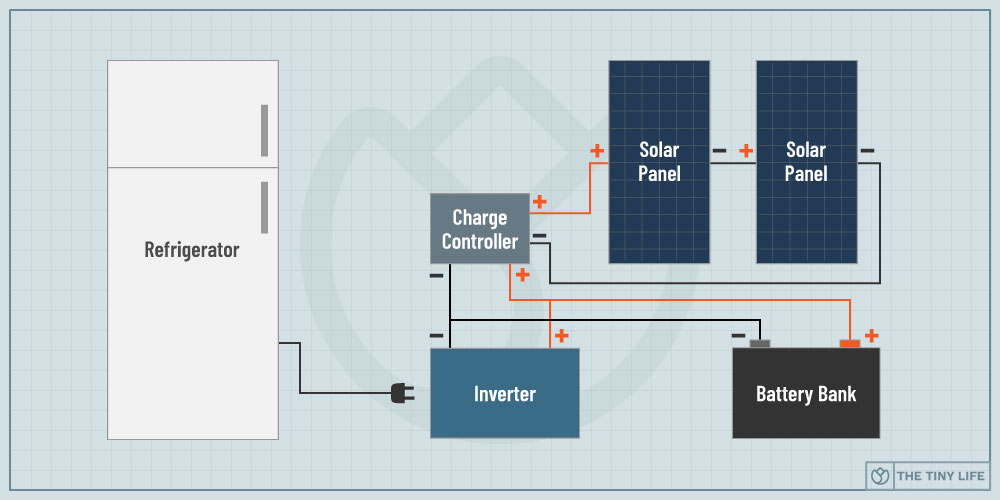
Refrigerator Options For A Solar Powered Refrigerator

When choosing an off-grid, solar powered fridge, there are an array of different options out there. Some options work better in a stationary tiny house while others are better for camping or a life on the move.
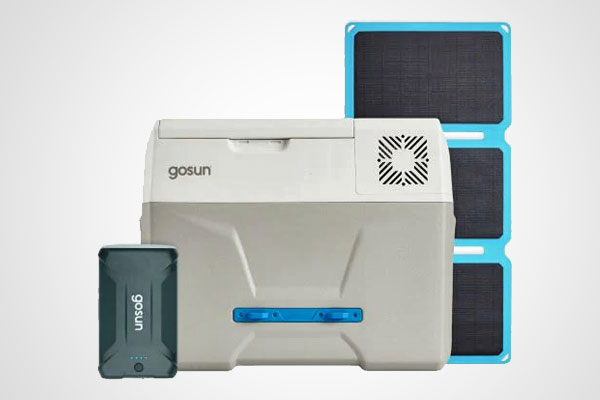 One thing to think about is whether or not your off-grid fridge will be running off of AC (Alternating Current) power or DC (Direct Current) power. It’s likely that your fridge will run on AC power, as is true of most household appliances. However, some fridges may be able to run on DC power, like solar coolers or RV fridges.
One thing to think about is whether or not your off-grid fridge will be running off of AC (Alternating Current) power or DC (Direct Current) power. It’s likely that your fridge will run on AC power, as is true of most household appliances. However, some fridges may be able to run on DC power, like solar coolers or RV fridges.
Solar panels generate DC power only. Thus, an inverter is needed for the solar battery or the solar array to power appliances that run on AC power. This is something to consider when thinking through an off-grid refrigeration system.
Many people have read around the internet that DC power is a more efficient way to power things when switching to solar. In most traditional homes, everything is wired for AC power, but since solar panels produce DC power, wiring for DC verses AC has different outcomes.
In my opinion, wiring for DC power is actually fairly limiting. I knew if I wired for DC, my entire home would be exclusively limited to DC powered appliances, which typically cost two to three times the cost of their AC equivalents.
Even after the losses through inefficiency, wiring for AC provides more power for less money. This is because the savings from going with AC appliances over DC is much better for the wallet, even with the cost of a couple extra panels.
Solar Coolers
The Go Sun Chillest is my favorite solar cooler I’ve been able to get my hands on. I’ve tried several other solar cooling products but none of them really compare. The Go Sun Chillest can run entirely on solar power and has controlled temps that range from -4°F to 68°F (-20°C to 20°C). It’s portable and moves on wheels for all terrain types, which is helpful if you’re off-grid camping.
RV Refrigerator With Solar Power
I have a lot of off-grid friends who ask me if it’s a good idea to run their RV fridge on solar. Running your RV refrigerator on solar power is definitely possible, and is actually a great idea.
A standard RV has two separate electrical systems within the vehicle: a 12-volt DC (direct current) and a 120-volt AC (alternating current) system. The DC current powers all devices in an RV, including the fridge. Solar panels emit DC power, so this works well in a recreational vehicle.
Converting A Full-Sized Fridge To Solar Power
Converting your full-sized fridge into a solar powered fridge is not as huge of a challenge as it may initially seem. Remember that a full-sized fridge is going to require the most power out of any fridge type.
Almost all fridges run on AC power as opposed to DC power. A full-sized fridge will also run-on AC power, so you’ll need an inverter for your fridge to run on solar successfully.
Using A Chest Freezer As An Off-Grid Fridge
Another off-grid cooling option is using a chest freezer as a fridge. You can easily convert a chest freezer into an off-grid refrigerator. One of the best things about a chest fridge is that it doesn’t require as much power as a traditionally sized one, or even a bar fridge.
When cold air sinks to the base of a traditional fridge, it causes the fridge to run more often, racking up the amount of power needed. A chest freezer is short, so the sinking cold air fills up the unit instead of sitting at the bottom of it. This means chest fridges require less energy and can stay cool for longer. They are better for your wallet, better for Mother Nature, and ideal for the off-grid life.
Best Generator For a Solar Refrigerator


In order to run anything on solar successfully, you’ll need a high-quality generator. Solar generators work by taking the energy collected by solar panels and then sending that energy into a solar battery to be stored. Solar generators are a necessary source of power for running small devices off the grid, like a solar powered fridge.
What Size Solar Generator Is Needed To Power A Fridge?


I personally love the Go Sun Power 1100 power bank. It has always provided enough power for my small fridge in my tiny home, with enough energy to run other essential devices as well, including cameras, lights, laptops, and more.
My solar fridge runs super well with this solar generator.
The Honda EU2000i inverter generator is also a great generator for running a smaller fridge and a few lights. However, the Honda inverter does use gas in order to power devices, which may not be the way you want to go. That’s why I use the Go Sun power bank.
At the end of the day, I’ve been very happy with everything that my solar powered fridge provides me with. It wasn’t that much of a challenge to get going with, and I don’t plan to go back on the grid anytime soon.
Your Turn!
- Will you use solar power to run your fridge?
- What type of off-grid fridge will you use?

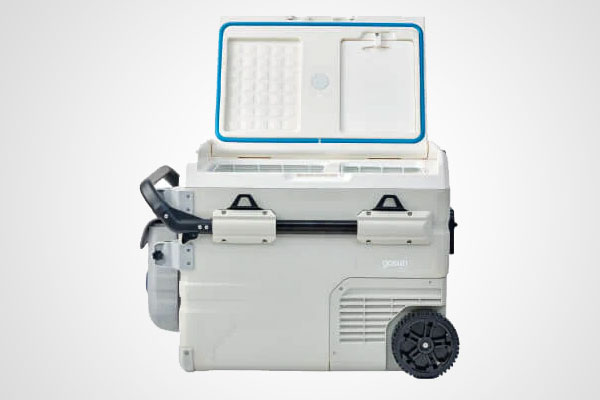


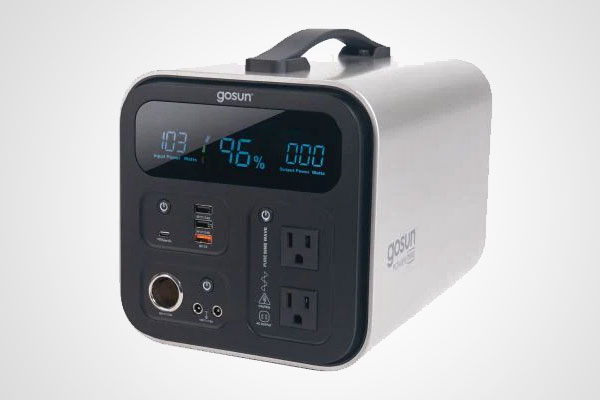
I am looking at options like this for my sailboat. It will already have solar, and either wind or hydro generators. While not a land based tiny home, still lots of crossover because space is valuable.
While planning to build my tiny to be off-grid, I have been considering fridge options, specifically typical fridge vs propane powered. I’ve read that a traditional fridge that is Energy Star rated can be energy efficient enough to put less demand on my solar system (I live in the north east and am concerned about not having enough sunlight to successfully run a tiny on solar alone). Your thoughts?
Affordable sizeable solar is a LONG way off. The panels are grossly inefficient, depend on full sun and have some serious nasties inside which disposal of has not yet been addressed. Solar in limited applications are fine, but for main stream living, at least 50 YEARS AWAY,